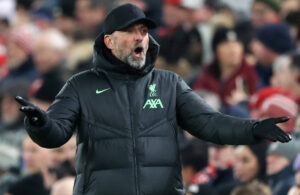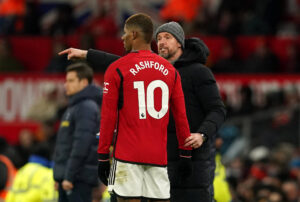When Bournemouth host Arsenal in the FA Cup fourth round on Monday, it will not only be the second time in just over a month that Eddie Howe and Mikel Arteta will have faced each other, after their teams drew 1-1 in the Premier League on Boxing Day in Arteta’s first match in charge of Arsenal. Even more importantly, the match will represent a clash between what might be called the old and the new managerial pathways, with Howe a product of the traditional, time-honoured route to managing in the top flight and Arteta the embodiment of what has become the new, fast-track route for top players to become top managers.
In the past, almost all managers, including even the very greatest ones such as Brian Clough and Alex Ferguson, literally worked their way up from the bottom to the top. It was believed that such an apprenticeship was absolutely essential for managers, even for those who had achieved great things as players, such as Clough and Ferguson, who had achieved great scoring feats in England and in Scotland respectively.
Eddie Howe v Mikel Arteta: The Old and the New
A Managerial Apprenticeship
The term ‘apprenticeship’ may seem an unusual one to apply to such wise and wizened figures as Clough and Ferguson, but it was believed, especially in England and Scotland, that anyone who wanted to go into management had to start right at the bottom, as Clough and Ferguson did with Hartlepools (when their name was still pluralised) and East Stirlingshire respectively. That way, it was thought, they could slowly learn all the varied aspects of management, from the coaching of players to man-management to operating in the transfer market.
Eddie Howe can be seen as the continuation of that tradition; indeed, he is probably the finest current product of it. Like Clough and Ferguson before him, he has managed his way up from the bottom. He arguably started at an even lower point than either Clough or Ferguson did, as he became Bournemouth manager while the club were fighting to remain within the fully professional League pyramid and avoid relegation into semi-professional Conference football, as it was at the time. Of course, he succeeded in that initial aim, and then capitalised upon it spectacularly by leading Bournemouth all the way through the professional leagues and finally into the Premier League. Even more impressively, he has kept them there while operating on probably the smallest average attendances of any club in England’s top-flight ever; not just in the Premier League era since 1992, but in all the 150 years or so of professional football in England.
Eddie Howe is not alone in having risen through the leagues, although he is unique at the present time in having done so with just one club. Other examples of current Premier League managers who have led a club from the lower reaches into the Premier League include Sean Dyche at Burnley and Chris Wilder at Sheffield United. And although Graham Potter has not actually led a club to promotion to the Premier League, his sterling coaching work, first with Ostersunds in Sweden and then with Swansea City in the Championship, persuaded Brighton & Hove Albion to appoint him as the replacement for Chris Hughton.
The Fast-Track Approach for Managers
Mikel Arteta has followed a completely different route to becoming the manager of Arsenal. As many critics of his appointment complained, the Arsenal job is actually his first-ever job as a head coach/manager (those two terms, which were once considered to signify very different roles, are increasingly interchangeable). Instead, after retiring as a player with Arsenal in 2016, he was personally head-hunted by Pep Guardiola to join his coaching staff at Manchester City, eventually becoming his assistant manager/right-hand man, before returning to Arsenal in December to replace Unai Emery.
It was probably Guardiola who began the very modern trend of big clubs (which Arsenal, for all their decade of decline under first Arsene Wenger and then Emery, still just about are) appointing former players as first-time managers. Famously, of course, he was appointed as manager of Barcelona in 2008, having been a star player under Johan Cruyff, Louis van Gaal and others for more than a decade and then managed the Barcelona B team.
Initially, Guardiola faltered, and many fans and pundits were openly wondering why Barcelona had appointed a completely inexperienced manager to lead their gigantic club. By the end of his first season, however, Guardiola had led Barcelona to their first-ever treble (La Liga, Copa del Rey and Champions League) and launched himself on the outstanding managerial career that has subsequently seen him winning multiple titles in Germany and England, if not yet another Champions League.
Since Guardiola’s successful appointment at Barcelona, many other big clubs have followed suit, not least Barcelona’s great Spanish rival (and their only serious rival for the unofficial title of biggest club in the world), Real Madrid. Madrid effectively made Zinedine Zidane, their greatest Galactico, their own Guardiola. In the Champions League at least, Zidane has actually outstripped Guardiola’s achievements with Barca, winning three in a row to Guardiola’s two in three seasons, even if he has not yet converted that European ascendancy into domestic domination of the kind that Barcelona enjoyed under Guardiola and indeed continue to enjoy nearly a decade after Guardiola’s departure.
The Trend Has Been Followed in the Premier League
The trend has not just been followed in Spain. In the Premier League, too, even the biggest clubs are increasingly turning to their former star players to take over as managers, with Manchester United and Chelsea appointing Ole Gunnar Solskjaer and Frank Lampard respectively, although whether they remain in charge may well depend on whether they can qualify for the Champions League next season. Similarly, Steven Gerrard became manager at Rangers (which, for all the snobbishness of many English fans about Scottish football, is certainly not a case of taking over a club at the bottom of the English League structure), presumably with an eye to replacing Jurgen Klopp whenever the German finishes as Liverpool manager. And John Terry has opted for a relatively high-level apprenticeship in assisting Dean Smith at Aston Villa, rather than going all the way to the bottom himself and starting out as a manager from scratch.
It is in that context that Arteta’s appointment as Arsenal manager is not nearly as startling as it once would have been. Indeed, in spending three years as Pep’s assistant at City, it is arguable (and the Arsenal hierarchy certainly accepted the validity of the argument) that Arteta had gained more valuable and, even more importantly, relevant experience as a coach than he would have working in a lower league.
Quite simply, because of the ever-increasing gap between the top level of football – and the highest level of club football is undoubtedly the Premier League and La Liga, which are probably the two most widely watched and most competitive leagues in the world – and the bottom level, not only in finances but in terms of sheer footballing ability, it seems that the biggest clubs increasingly believe that it is far better to appoint a former top player with no managerial experience than it is to appoint a manager from a lower level. Such a manager may have succeeded at that lower level but they will have no direct experience of the infinitely greater pressure and scrutiny involved in managing a top club.
The Merits and Drawbacks of Both Pathways
Both the old and the new managerial pathways have their merits and their drawbacks. The old ‘work your way up from the bottom’ approach means that such managers, like Eddie Howe, have a huge reservoir of managerial experience to draw upon when they finally reach the top flight. That experience is probably never more important than when they are confronted with a downturn in their team’s form, as is the case with Howe at Bournemouth now. On the other hand, the fact that they have worked their way up from the bottom, and in Howe’s case done so with just one club, may mean that they will never be considered for a top job, precisely because it is felt that their experience at a lower level does not necessarily equip them for managing a much bigger and historically more successful club.
Incidentally, that may just be why Eddie Howe is currently experiencing probably his most difficult time as Bournemouth manager, at least since he fought off relegation to the Conference more than a decade ago. In the last few months, even though Arsenal, Everton and West Ham United have all replaced their managers, it would appear that none of them even remotely considered Howe as a replacement. Consequently, it is not impossible that Howe, having failed to get his move to a ‘big club’ (or indeed even been considered for such a move), may just be struggling to motivate himself even more than he does his players.
However, the new fast-track pathway to becoming a top manager, or at least a manager at a big club, is also not without its drawbacks. Although it is undoubtedly true, for example, that Arteta has learned first-hand from Guardiola, who is arguably the greatest manager in the world right now (at least until Jurgen Klopp wins another couple of Premier Leagues or Champions Leagues) exactly what is involved in managing a big club with big expectations, on the other hand, he has absolutely no actual, practical experience of being a manager himself to draw upon in difficult times. And such times which will surely not be far away at Arsenal, especially if, as seems increasingly likely, Arteta does not significantly strengthen the paper-thin and injury-ravaged Gunners defence in the January transfer window.
Which Approach is Best? The Eddie Howe or Mikel Arteta One?
Which approach, or which managerial pathway, is better – old or new? Well, the FA Cup clash between Arsenal and Bournemouth will go some way towards answering that question. In truth, though, it will almost certainly only be at the end of the season when a considered judgement can be made. If Howe can keep Bournemouth in the Premier League, and if Arteta can somehow get Arsenal back to the Champions League (either via the Premier League or by winning the Europa League), it might be argued that both pathways are equally valid.
Indeed, in that scenario, it could be said that for smaller and historically less successful clubs, such as Bournemouth, the old work your way up approach is best, whereas, for the bigger and traditionally more successful clubs, such as Arsenal, the new fast-track route is the one to follow. Equally, if neither Eddie Howe nor Mikel Arteta achieves their primary aim, it may be time for both Bournemouth and Arsenal to consider adopting an entirely new approach to appointing managers.
Main Photo






